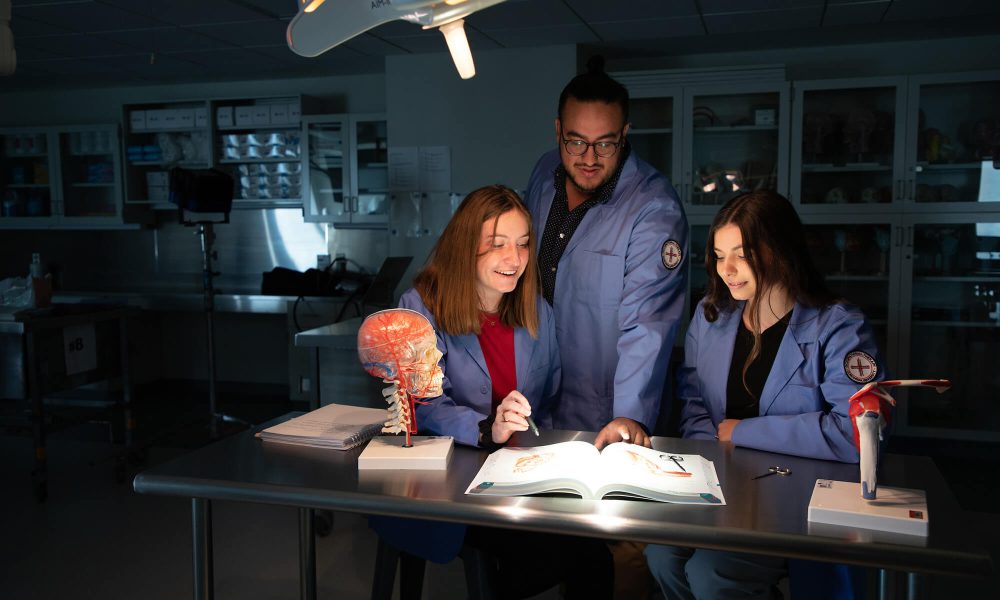
Concordia’s Master of Occupational Therapy (MOT) or Doctor of Occupational Therapy (OTD) offers a possible path for individuals seeking to pursue their calling as occupational therapists, regardless of their current stage of the journey.
Concordia University recently signed an articulation agreement with the Michigan University of Technology.
This agreement will ensure that students enrolled in a bachelor’s degree program at Michigan Technological University (MTU) and seeking admission to the Wisconsin campus of Concordia University for the foundational Master of Occupational Therapy (MOT) or Doctor of Occupational Therapy (OTD) will be given priority admission status.
Find out more if the MOT or OTD programs are right for you.
Why is priority admission important?
Priority admission allows us to review the applications from MTU students separately from and before the general applicant pool. Because of this, students applying with priority admission have a higher chance of selection for the program.
What is the significance and what factors contributed to CUW’s partnership with Michigan Tech?
We have a recent student who is an alum of MTU and their pre-healthcare professions advisor reached out to CUW’s admission team. MTU is located in the upper peninsula of Michigan and does not offer a graduate-level occupational therapy degree. Working with them to provide a pathway for students who want to become occupational therapists has been a great experience.
What are the fieldwork requirements for the program?
OT educational programs include 2 types of fieldwork experiences: Level I and Level II. At CUW, Level I experiences are provided in pediatrics and behavioral health through a 1-week intensive residency requirement during the second summer of the program. Level II experiences happen after students complete their didactic coursework. Every student will complete 2, 12-week Level II fieldwork experiences, each in a different practice setting. Level II experiences are the final step in the educational process. This is where students practice full-time, under the supervision of a licensed OT. Here they apply the knowledge they’ve acquired in the classroom.
What are the employment outcomes for graduates of the program?
- An important metric of success for OT programs is Licensure Exam Pass Rate, and CUW Occupational Therapy’s current pass rate is 97%
- Additionally, based on our last “new grad” survey — here’s where our recent grads are at now:
- 75% of new grads were employed in OT
- 20% were applying for further educational opportunities
- 5% were still seeking employment
- Additionally, based on our last “new grad” survey — here’s where our recent grads are at now:
What are the most important skills and competencies that you aim to impart to students during the program?
Our students will graduate with the hands-on clinical skills needed to both evaluate and treat clients in a variety of clinical settings. Even more importantly, we highly value the professional reasoning skills, leadership skills, and advocacy skills that our students gain. Our hope is that they use these skills to become change agents in the profession.
What advice do you have for students who are considering pursuing a career in occupational therapy?
Spend time shadowing occupational therapists in at least 2 different settings. It’s important to have a sense of what makes us unique in the healthcare and educational setting we work in.
If potential students have a question about this program, or OT in general, who should they reach out to?
As the program director, I LOVE talking to future occupational therapists. Please reach out to me at Meghan.watry-christian@cuw.edu
Want in?
Concordia’s OT program makes stepping forward in your calling as an occupational therapist attainable no matter where you are in your journey. Our multiple program pathways and hybrid course formatting will prepare you holistically. Through our faith-based, student-centered curriculum, and diverse, hands-on, clinical experiences you will graduate confident in your skills. Learn more about our programs below.
—Dr. Meghan Watry-Christian, PHD, OT-L, is the Department Chair of the Department of Master of Occupational Therapy (MOT) and Doctor of Occupational Therapy (OTD) Programs and is an Associate Professor within the School of Health Professions.